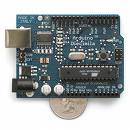CSC231 Lab 6
Back to CSC231 Weekly Schedule
CSC 231 Lab # 6
© D. Thiebaut, 2008
In this lab we are going to make the Arduino keep on listening to commands it gets from the assembly language on the PC, and execute each command as it receives them.
Getting the Messenger Library for the Arduino
You need a new library for the Arduino called SimpleMessageSystem (Note: there is a newer version of it, Messenger, but I haven't been able to play with it enough to make it the version to use for the project.)
- Boot the Ubuntu CD-Rom
- Open a Terminal window and type
sudo su cd cd arduino-0010/hardware/libraries
- download the library file from the Arduino Playground:
wget http://www.arduino.cc/playground/uploads/Code/SimpleMessageSystem.zip
- unzip the file
unzip SimpleMessageSystem.zip
- Remove the archive file
rm SimpleMessageSystem.zip
- Set the ownership of the new library the same ownership as that of the arduino software
chown -R 1000:1000 SimpleMessageSystem
- Open the arduino GUI and create this new sketch
/*
---- SimpleMessageSystem Example 1 ----
Control Arduino board functions with the following messages:
r a -> read analog pins
r d -> read digital pins
w d [pin] [value] -> write digital pin
w a [pin] [value] -> write analog pin
Base: Thomas Ouellet Fredericks
Additions: Alexandre Quessy
*/
// Include de SimpleMessageSystem library
// REMOVE THE FOLLOWING LINE IF USING WIRING
#include <SimpleMessageSystem.h>
void setup() {
// The following command initiates the serial port at 9600 baud. Please note this is VERY SLOW!!!!!!
// I suggest you use higher speeds in your own code. You can go up to 115200 with the USB version, that's 12x faster
Serial.begin(9600); //Baud set at 9600 for compatibility, CHANGE!
}
void loop() {
if (messageBuild() > 0) { // Checks to see if the message is complete and erases any previous messages
switch (messageGetChar()) { // Gets the first word as a character
case 'r': // Read pins (analog or digital)
readpins(); // Call the readpins function
break; // Break from the switch
case 'w': // Write pin
writepin(); // Call the writepin function
}
}
}
void readpins(){ // Read pins (analog or digital)
switch (messageGetChar()) { // Gets the next word as a character
case 'd': // READ digital pins
messageSendChar('d'); // Echo what is being read
for (char i=2;i<14;i++) {
messageSendInt(digitalRead(i)); // Read pins 2 to 13
}
messageEnd(); // Terminate the message being sent
break; // Break from the switch
case 'a': // READ analog pins
messageSendChar('a'); // Echo what is being read
for (char i=0;i<6;i++) {
messageSendInt(analogRead(i)); // Read pins 0 to 5
}
messageEnd(); // Terminate the message being sent
}
}
void writepin() { // Write pin
int pin;
int state;
switch (messageGetChar()) { // Gets the next word as a character
case 'a' : // WRITE an analog pin
pin = messageGetInt(); // Gets the next word as an integer
state = messageGetInt(); // Gets the next word as an integer
pinMode(pin, OUTPUT); //Sets the state of the pin to an output
analogWrite(pin, state); //Sets the PWM of the pin
break; // Break from the switch
case 'd' : // WRITE a digital pin
pin = messageGetInt(); // Gets the next word as an integer
state = messageGetInt(); // Gets the next word as an integer
pinMode(pin,OUTPUT); //Sets the state of the pin to an output
digitalWrite(pin,state); //Sets the state of the pin HIGH (1) or LOW (0)
}
}
- Compile and download it to your Arduino
- You may get warnings, but make sure you get a compile confirmation:
Binary sketch size: 3402 bytes (of a 14336 byte maximum)
- I M P O R T A N T
Note: When you boot your PC in Ubuntu mode from the live CD, you are working with a Linux computer that exists only on the CD and in the RAM. Whatever you create or copy to your ubuntu or root account exists only in RAM. As soon as you close the system, all your changes disappear. All the files you created disappear. For this reason, you will need a USB key to save all the files you create, including sketches and libraries, such as the Messenger library you created above.
Assembly Part
- Open a Terminal window under Ubuntu and type
sudo su cd
- Highlight the contents of the file driver.c and copy it to the clipboard
- In the terminal window type
cat > driver.c
- and then click the middle button of your mouse to paste the code you had highlighted
- Type Control-D to close the file.
- Repeat the same operations for the files
